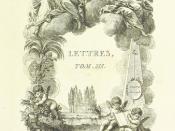Jean-Jacques Rousseau begins his "Social contract" with the classic statement "Man was born free, and everywhere he is in chains." Upon making this statement Rousseau means that after man leaves the state of nature and enters civilization he subjects himself to new restrictions that never infringed on his personal liberty in the natural state. Rousseau's social contract had a principal goal of showing how although man has to be governed and abide laws, liberty can be maintained and political institutions can be and must be legitimate. If the laws or regime are illegitimate, by design, they should not be supported and they should be repealed. Rousseau realizes that a return to natural liberty like that in the state of nature is an impossibility at this point in civilization. However, man can regain another type of liberty, moral liberty. Moral liberty allows each individual to be "masters of themselves". Human beings are essentially free, and were free in the State of Nature, but the progress of society has created subservience to others, through dependence for socioeconomic needs and how we view ourselves through comparison with others.
Therefore the problem that the social contract seeks to solve is how we can live free while are lives are intertwined amongst each other in society. In this paper, I intend on exploring the concepts of legitimate and illegitimate government.
Rousseau discusses the idea of "might makes right" in book I of the social contract. Rousseau is revealing that personal liberty and freedom are at stake under an absolute monarch. Rousseau believes that if an individual is coerced into an act of obedience to a ruler that does not necessarily confer any legitimate power to the ruler because the only reason he is obeyed is the threat of force that will force individuals to oblige.


